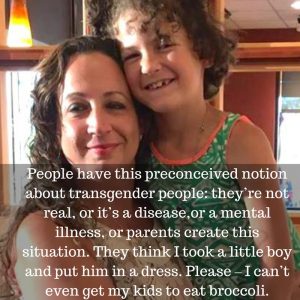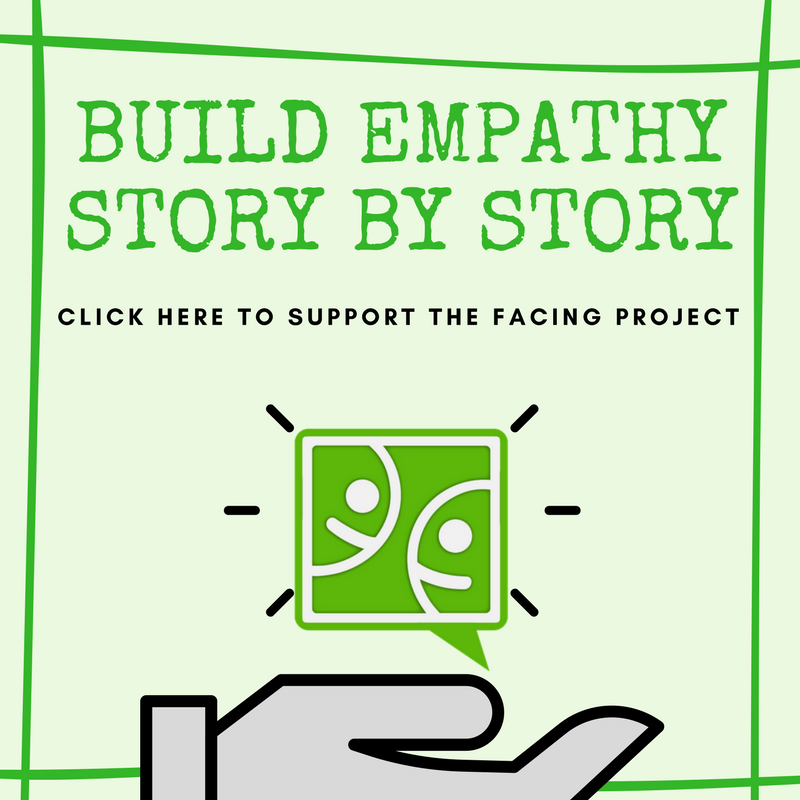Hearts & Homes
Katie’s Story
I’ve taken great care in constructing my home. Not the physical house—there’s, like, a one-in-five chance every day that I’ll fall in the parking lot walking in heels to work each morning—so I stay away from hammers and nails when possible.
No, I mean home – not just a material structure, but a feeling of love and acceptance. It’s not always an easy thing to construct, but, because of my daughter Elizabeth, I’ve found the most amazing community in which to do so.
I’ve learned a lot of things from Elizabeth. Even at seven years old, with dark, springy curls and a toothy grin, she knows herself better than most 40-year-old women I know. She’s so self-aware. Elizabeth is honestly one of the most amazing children I’ve ever encountered: she’s beautiful and smart and funny and talented.
She also happens to have been born a boy.
Ever since she was able to communicate and have her own personality, I knew there was something different about her. For me, it was a matter of putting the puzzle pieces together and figuring out what it was. But despite all the possible scenarios, “transgender” never crossed my mind.
For a lot of people, that might have been a stumbling block. Luckily, because I’m pretty open-minded, I never had a second thought about it. It took a little time, but, for me, there’s no question – you just love your kid. We have been transitioning for a few months now. You can see a difference: Elizabeth is really living an authentic life, and she’s happy. She’s starting to build a strong foundation for her future home, her own space of love and acceptance.
While her transition has been pretty smooth so far, we haven’t been without our own cracks in the walls. I’ve had people state that I have a mental condition, and that my children should be taken away by Child Protective Services. It’s like there’s this gang mentality. People have this preconceived notion about transgender people: they’re not real, or it’s a disease, or a mental illness, or parents create this situation. They think I took a little boy and put him in a dress.
Please – I can’t even get my kids to eat broccoli.
Elizabeth experiences it, too. One little girl told her that “Jesus doesn’t approve of that; that’s not what Jesus wants.” Pretty heavy stuff to deal with. She’s very sensitive and very loving and compassionate; she wants everyone to like her and be happy. When someone says something hurtful, something she sits and thinks about, it sticks. It’s hard to build with crumbling blocks.
But this experience has also given us tools. What I’ve found is I have amazing support; for the most part, we have had the most loving and positive reception. As a whole, the LGBTQ community is so much more accepting and loving than many of us, and I am so honored that they have accepted me as a part of their family.
I don’t think the LGBTQ community is as small as everyone thinks. I feel like there are other children out there; their parents are afraid to come forward, or the children are afraid to come forward. I just hope that by being so open and telling our story, it’ll show families that it’s okay to let your child be who they are. There is a support system locally. We can be your home.
This community I am a part of is a family of welders, not wrecking balls. We bring things together. We make them stronger. You can’t be a weak person or a weak parent and be “out” like we are. We can be hit with a lot of negativity, but this whole experience has taught me to be more loving and accepting. I see this as an opportunity for me to advocate and educate and maybe create a path for a better future for Elizabeth. It really just boils down to loving your child for exactly who they are.
Here’s the thing: the whole situation going on in the country right now, with all of the turmoil and all of the hate – it’s not really an issue about God or about lifestyle choices or about sin or Hell. It’s an issue about heart and acceptance.
People need to live in their own houses, and if they don’t want to visit their neighbor’s house, they don’t. They especially don’t need to vandalize or destroy it.
I wouldn’t change Elizabeth for anything. This is a girl who, after learning about adoption, cried because there are babies in the world with no parents. This is a girl who spends her time tearing napkins into paper hearts to give to people she just met. This is a girl who hopes that all people –transgender or not – can “have a happy life.”
Some people might take issue with the first four words of the preceding sentences. As her mother, I’m most proud of what comes after.
A lot of people have reached out and called her “a hero” for being brave enough to speak her story. But she doesn’t know any different. That’s just Elizabeth, and it’s been an adventure and just a joy to see her bloom into who she is.
I am so blessed to have the community that I do. I am a part of a family of acceptance, kindness, compassion, understanding, and love. These are the elemental stones with which we build our house. If you’re ever in the neighborhood, just knock on our door. We are always home.
As told to Kate DeVantier by Katie Flesch
This story originally appeared in Facing Intolerance, a publication of The Facing Project that was organized by Wittenberg University in Springfield, Ohio.
Are you interested in seeing more stories like this? If so, we need your help. Check out the Build Empathy Story-By-Story Campaign to learn how you can plug into the work of The Facing Project.
About The Facing Project:
The Facing Project is a 501(c)(3) nonprofit organization that connects people through stories to strengthen communities. The organization’s model to share stories and raise awareness is in cities across the United States focused on topics such as poverty, sex trafficking, mental health, immigration, and more. Facing Project stories are compiled into books and on the web for a community resource, used to inspire art, photography, monologues and—most importantly—community-wide awareness, dialogue, action, and change toward a more understanding and empathetic society.



